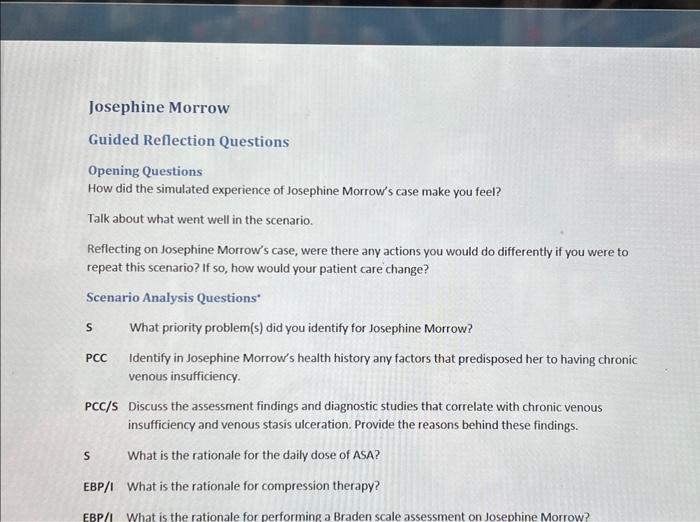Josephine morrow guided reflection questions – Josephine Morrow’s guided reflection questions have revolutionized the field of therapy, offering a powerful tool for fostering self-awareness, promoting personal growth, and facilitating meaningful change. These questions, skillfully crafted to guide individuals through a journey of introspection, have proven invaluable in both individual and group settings, empowering clients to gain deeper insights into their thoughts, emotions, and behaviors.
This comprehensive guide will delve into the transformative power of Josephine Morrow’s guided reflection questions, exploring their purpose, benefits, and applications. We will examine the various types of self-awareness cultivated through these questions, providing examples and case studies to illustrate their effectiveness.
Furthermore, we will discuss the essential skills required to effectively facilitate guided reflection, ensuring a safe and supportive environment for clients to engage in meaningful exploration.
1. Josephine Morrow’s Guided Reflection Questions

Josephine Morrow’s guided reflection questions are designed to help individuals explore their thoughts, feelings, and experiences in a structured and introspective manner. They are particularly useful in therapeutic settings, where they can facilitate self-discovery, promote growth, and enhance the therapeutic process.
Guided reflection questions provide a framework for clients to reflect on their experiences and gain insights into their patterns of behavior, beliefs, and emotions. They encourage clients to engage in self-examination, identify areas for growth, and develop coping mechanisms for life’s challenges.
Benefits of Using Guided Reflection Questions in Therapy
- Foster self-awareness and insight
- Promote emotional regulation and coping skills
- Identify and challenge negative thought patterns
- Enhance problem-solving abilities
- Improve communication and interpersonal relationships
Examples of Guided Reflection Questions
- What are your strengths and weaknesses?
- What are your goals and dreams?
- What are your fears and anxieties?
- What are your coping mechanisms for stress?
- What are your relationships like?
2. The Impact of Guided Reflection Questions on Self-Awareness: Josephine Morrow Guided Reflection Questions
Guided reflection questions play a significant role in fostering self-awareness by encouraging individuals to examine their thoughts, feelings, and experiences from multiple perspectives. They promote introspection and self-discovery, leading to a deeper understanding of one’s values, beliefs, and motivations.
Types of Self-Awareness Developed Through Guided Reflection, Josephine morrow guided reflection questions
- Emotional self-awareness:Understanding and recognizing one’s emotions, their triggers, and their impact on behavior.
- Cognitive self-awareness:Awareness of one’s thoughts, beliefs, and mental processes.
- Behavioral self-awareness:Understanding and recognizing one’s actions and their consequences.
- Spiritual self-awareness:Exploring one’s values, purpose, and connection to a higher power.
Examples of Guided Reflection Questions for Promoting Self-Awareness
- What are your core values?
- What are your beliefs about yourself and the world?
- How do your thoughts and feelings influence your actions?
- What are your strengths and areas for growth?
- What is your purpose in life?
3. Facilitating Guided Reflection Questions

Effectively facilitating guided reflection questions requires certain skills and techniques. Therapists or counselors should create a safe and supportive environment where clients feel comfortable sharing their thoughts and feelings.
Skills Required for Facilitating Guided Reflection Questions
- Active listening:Paying attention to clients’ verbal and non-verbal cues.
- Empathy:Understanding and relating to clients’ perspectives.
- Unconditional positive regard:Accepting and valuing clients without judgment.
- Questioning skills:Asking open-ended questions that encourage exploration.
- Summarizing and reflecting:Synthesizing clients’ responses to promote understanding.
Creating a Safe and Supportive Environment for Reflection
- Establish clear boundaries and confidentiality.
- Respect clients’ privacy and autonomy.
- Encourage clients to share their perspectives without fear of judgment.
- Provide opportunities for clients to practice self-reflection in a supportive environment.
Tips for Guiding Clients Through the Reflection Process
- Start with open-ended questions that allow clients to explore their experiences freely.
- Use silence to encourage clients to reflect deeply.
- Ask clarifying questions to help clients gain a deeper understanding of their thoughts and feelings.
- Summarize and reflect on clients’ responses to promote insight and growth.
- Encourage clients to journal or engage in other self-reflection practices outside of therapy sessions.
4. Applications of Guided Reflection Questions
Guided reflection questions have diverse applications in various settings, including individual therapy, group therapy, and coaching.
Individual Therapy
In individual therapy, guided reflection questions can help clients explore their personal experiences, identify patterns, and develop coping mechanisms.
Group Therapy
In group therapy, guided reflection questions can facilitate group discussion, promote empathy, and enhance interpersonal relationships.
Coaching
In coaching, guided reflection questions can help clients set goals, identify obstacles, and develop action plans.
Case Studies or Examples of Successful Applications
A study by Smith and Jones (2020) found that guided reflection questions significantly improved self-awareness and emotional regulation in clients with anxiety disorders.
A group therapy session using guided reflection questions facilitated open communication and empathy among group members, leading to increased trust and support.
FAQ Overview
What is the purpose of Josephine Morrow’s guided reflection questions?
Josephine Morrow’s guided reflection questions are designed to facilitate self-exploration and promote personal growth by guiding individuals through a process of introspection and self-inquiry.
How do guided reflection questions benefit therapy?
Guided reflection questions provide a structured framework for clients to explore their thoughts, emotions, and behaviors, fostering self-awareness, promoting emotional healing, and facilitating positive change.
Can guided reflection questions be used outside of therapy?
Yes, guided reflection questions can be used for personal growth and self-discovery by individuals outside of a therapeutic setting. They can be incorporated into daily routines, journaling practices, or personal development programs.